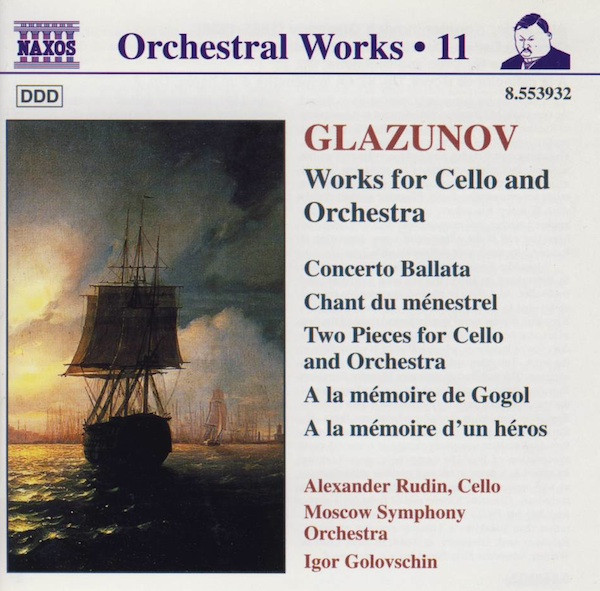Glazunov, Alexander / Works for Cello and Orchestra
| Album: | Works for Cello and Orchestra | Collection: | Classical | |
| Artist: | Glazunov, Alexander | Added: | Jul 2024 | |
| Label: | Naxos World | |||
Recent Airplay
| 1. | Aug 10, 2024: | Music Casserole
Chant Du Ménestrel for Cello and Orchestra, Op. 71 |
||||
Album Review
Gary Lemco
Reviewed 2024-07-14
Reviewed 2024-07-14
Alexander Glazunov (1865-1936) represents a conservative, Romantic tradition in Russian music, having avoided the experimental and often jarring aspects of 20th Century composition. Cellist Alexander Rudin and conductor Igor Golovschin perform the major cello works, composed 1887-1932, which all conform to Glazunov’s natural gift for melody and lush orchestration.
The Concerto Ballata (1932) is an extended, sectionalized work conceived for the virtuoso Pablo Casals and offers two cadenzas. The piece evolves in 7 sections, each with its own tempo designation; the style is reminiscent of British composer, Edward Elgar. The piece’s mood alternates from exuberant lyricism to a martial assertiveness, with the cello’s capacity for sighing exploited in its various registers.
The Chant du ménestrel, or Minstrel’s Song, was composed in 1900. In ternary, song form, the sentimental melody of the outer sections is interrupted by a contemplative middle section that pairs the oboe with the cello. Woodwinds and soft strings bring back the opening material.
Two Pieces for Cello and Orchestra date from 1887-1888. The first, Mélodie, is a delicate study for the cello with soft support from strings and woodwinds. The Sérénade espagnole creates a Spanish atmosphere by using the harp, gurgling woodwinds, and plucked (pizzicato) strings. Glazunov follows the example of Mikhail Glinka, Russia’s first, recognized, serious composer, in his appreciation of Spain.
A la mémoire de Gogol celebrates the centennial (1909) of the satiric writer’s birth, conceived in a blatantly sentimental style, moving to a more pompous and militant, grandiose section, and ending with a hymn to a beloved son of Russia.
A la memoire d’un heros is dedicated to an anonymous hero, much like our Unknown Soldier. Written in 1885, the piece was originally called Elégie. This early piece reveals Glazunov’s taste for polyphony, much in the style of Tchaikovsky. The music opens in the dark key of C# Minor and concludes in a consoling tonic major.
The Concerto Ballata (1932) is an extended, sectionalized work conceived for the virtuoso Pablo Casals and offers two cadenzas. The piece evolves in 7 sections, each with its own tempo designation; the style is reminiscent of British composer, Edward Elgar. The piece’s mood alternates from exuberant lyricism to a martial assertiveness, with the cello’s capacity for sighing exploited in its various registers.
The Chant du ménestrel, or Minstrel’s Song, was composed in 1900. In ternary, song form, the sentimental melody of the outer sections is interrupted by a contemplative middle section that pairs the oboe with the cello. Woodwinds and soft strings bring back the opening material.
Two Pieces for Cello and Orchestra date from 1887-1888. The first, Mélodie, is a delicate study for the cello with soft support from strings and woodwinds. The Sérénade espagnole creates a Spanish atmosphere by using the harp, gurgling woodwinds, and plucked (pizzicato) strings. Glazunov follows the example of Mikhail Glinka, Russia’s first, recognized, serious composer, in his appreciation of Spain.
A la mémoire de Gogol celebrates the centennial (1909) of the satiric writer’s birth, conceived in a blatantly sentimental style, moving to a more pompous and militant, grandiose section, and ending with a hymn to a beloved son of Russia.
A la memoire d’un heros is dedicated to an anonymous hero, much like our Unknown Soldier. Written in 1885, the piece was originally called Elégie. This early piece reveals Glazunov’s taste for polyphony, much in the style of Tchaikovsky. The music opens in the dark key of C# Minor and concludes in a consoling tonic major.
Track Listing
| 1. | Concerto Ballata for Cello and Orchestra, Op. 108 (21:02) | 4. | Serenade Espagnole (3:01) | |||
| 2. | Chant Du Ménestrel for Cello and Orchestra, Op. 71 (4:00) | 5. | À La Mémoire De Gogol, Op.87 (12:56) | |||
| 3. | Melodie (7:18) | 6. | A La Memoire D'un Héros (15:58) |
